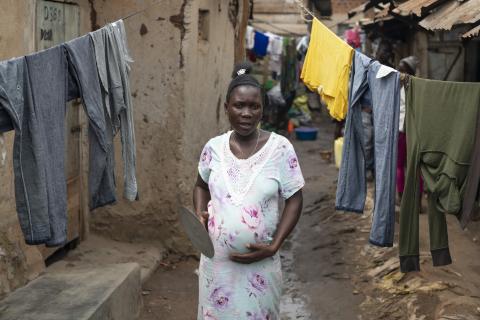Intensified antenatal care nutrition interventions in Burkina Faso
This is a summary of the following paper: Kim S, Zagré R, Ouédraogo C et al (2023) Intensified nutrition interventions in antenatal care services increased consumption of iron and folic acid supplements and early breastfeeding practices in Burkina Faso: Results of a cluster-randomized program evaluation. The Journal of Nutrition. https://doi.org/10.1016/j.tjnut.2023.06.016
Despite improvements in the receipt of antenatal care (ANC) and iron and folic acid (IFA) supplements during pregnancy in Burkina Faso, evidence on the integration and quality of nutrition interventions in ANC services, as well as on the utilisation and impact of these services, remains limited.
From 2020 to 2021, Alive & Thrive supported the Government of Burkina Faso to strengthen the provision of IFA supplementation and interpersonal counselling delivered through ANC services and community-based contacts in two western regions - Boucle du Mouhoun and Hauts-Bassins. As part of the intensified nutrition intervention package, counselling emphasised the importance of early, and regular, ANC attendance, adequate food intake and dietary diversity, adherence to IFA supplementation, adequate weight gain, and early initiation and continuation of exclusive breastfeeding. Routine monitoring of weight gain was also implemented.
A cluster-randomised evaluation, with baseline (2019, N=2,880) and endline (2021, n=2,880) cross-sectional surveys, was conducted with pregnant and recently delivered women to assess the impacts of intensified nutrition interventions during ANC (compared with standard ANC) on intervention coverage and maternal nutrition practices. Demographic and socio-economic characteristics were similar for women in the intervention and control areas, with an average age of 27 years. Most women were married and had experienced at least one previous pregnancy, over 60% had never attended school, and approximately 60% lived in food-secure households.
The evaluation findings showed improvements in coverage of ANC visits, with women in intervention areas being more likely to attend their first ANC visit during the first trimester and to attend at least four visits during their pregnancy. Impacts on coverage of community-based contacts were particularly notable: the proportion of women who experienced any home visits increased by 35% and those attending community meetings increased by 27%. In addition, more women in the intervention areas received nutrition counselling, had their weight measured more frequently, and reported having sufficient IFA tablets during their pregnancy.
Impacts on women’s behaviour were more mixed. Women in intervention areas consumed, on average, 21 more IFA tablets than women in control areas, although the percentage of women who consumed â¥180 IFA tablets during pregnancy remained low overall. There was no impact of the intensified nutrition intervention package on women’s diets, with low dietary diversity observed for both intervention and control areas. However, there were significant impacts on early initiation of breastfeeding and exclusive breastfeeding in intervention areas.
Overall, this study provides a good example of how nutrition interventions can be strengthened within government-delivered ANC services, with particularly notable improvements in service coverage and nutrition counselling, as well as on adherence to IFA supplementation and breastfeeding practices. However, the lack of impact on women’s dietary practices warrants attention. As highlighted by the authors, contextual factors such as levels of household food insecurity, social norms, and family support may be contributing and should be considered in future efforts to improve women’s diets. Finally, while the authors confirm that the integration of the intensified nutrition intervention package into existing health systems and services was feasible, the scalability of such a model beyond the study context requires further investigation.

